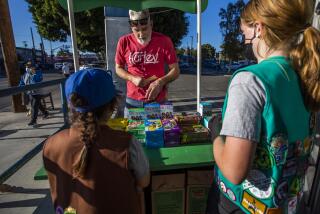Real Troopers
- Share via
Some of the Scouts gather around the roaring fire at Doheny State Beach, others try their hand at poker on a nearby picnic table.
To get his troop into the camping spirit, scoutmaster Russ Rinner grabs his guitar and hoots, “In your best voice let’s sing ‘I Am a Pizza.’ ”
The boys whoop, and as Rinner strums and sings, they repeat the words to the silly song.
“I am a pizza, peppers on top, out of the oven and into the box.
“Into the car and upside down, I am a pizza dropped on the ground.
“I was a pizza, I was the best. I was a pizza and now I’m a mess.”
Next comes “Gnarly Dude Boy Scout,” a song Rinner wrote, and a half-dozen other tunes troop members like to croon on their camping trips.
The weekend outing at the beach is a special treat for members of Boy Scout Troop 722 of Placentia: It is a time to get to know one another better and a chance for troop members, who are all developmentally disabled, to be out on their own.
They pitch tents, cook up carne asada tacos and blueberry pancakes, take hikes along the shore to search for seashells, play horseshoes and dunk themselves in the cool ocean water.
“What I like about camping is being in the outdoors--away from home,” says Rinner’s son Chris, 19. He’s barefoot and happily digging his feet into the warm sand. “And I like the camp songs we sing.”
Scout Joshua Kerr, 20, of Anaheim agrees: “I don’t like to just sit at home and do nothing. I like to be out by myself without my parents.”
Some parents volunteer to accompany the troop on camping outings and have an equally good time.
“Camp-outs are my favorite,” says Dorothy Moore. The reason: Moore enjoys seeing her son, troop member Ryan Sirmans, 21, having a good time.
“We just love to camp, even though it can be difficult because of his wheelchair,” she says. “But with this troop, everything is geared for kids with limitations.”
Rosemary Murphy of Fullerton says there was a time she would not have felt comfortable sending her 16-year-old son, Kevin, on an overnight excursion with the troop. “Now I can leave him by himself, and he gets to do what other boys do: camp and work on merit badges. This is part of growing up, and our troop makes it as normal as possible for these kids.”
These parents agree that having a troop for boys with special needs gives their sons a wealth of educational, recreational and social opportunities that help them build self-esteem and achieve goals.
“The more they get to do and participate in, the higher quality their life is,” says Moore, of Yorba Linda. “They should have the same opportunities and activities as anyone else.”
And that’s what Troop 722 strives to achieve.
Scoutmaster Rinner says the boys learn the same skills, must memorize the same oath, work to achieve merit badges and even the highest rank of Eagle Scout, just like their counterparts in mainstream troops.
“We work around each Scout’s ability,” says Rinner, who became involved in the troop eight years ago. “With our troop, what really matters for us is they do the best that they can.”
For the 19 troop members, ages 13 to 35, (there is no age limit for special-needs Scouts) it may take extra time to grasp how to tie a clove hitch, learn the words of the Scout motto or earn a merit badge.
Like their mainstream counterparts, members of Troop 722 have earned scores of badges.
“It makes me feel really good,” says Scott Moore, 24, who has earned two dozen merit badges and proudly carries his Scout handbook tucked under his arm.
Moore’s father, assistant scoutmaster Larry Moore of Placentia, has been involved since his son joined 10 years ago. The program is flexible to meet the boys’ needs, he says. “Because of their disabilities, it takes them longer to learn. But they work at it with the same enthusiasm as regular Scouts.”
Tim Lotz, 24, of Yorba Linda says that of the 23 merit badges he’s earned, the one for fishing is his favorite. Not only does he like to fish, he says, but “I like to go fishing with my dad.”
Several members of the troop are working toward becoming Eagle Scout.
Chris Rinner says for his Eagle project he wants to help distribute food to homeless and needy people. “I just thought it would be good to help out the community because there are a lot of hungry people,” he says. “I’m really going to try my hardest to do it. I would feel proud.”
“We would all be proud,” his father adds.
*
Nationwide, there are 4,000 Cub Scout packs, Boy Scout troops and Explorer posts registered as special-needs units, according to Gregg Shields, spokesman for Boys Scouts of America.
Those units have an estimated 109,000 youth members and 22,000 adult members, he says.
Many more Scouts with disabilities, though, are members of mainstream troops.
Shields says that throughout the history of Boy Scouts, the focus has been to place special-needs boys in mainstream Scouting. But he adds, whether boys with disabilities have a troop of their own or are mainstreamed, “It has worked very well both ways. It’s just an individual decision to be made based on what’s available and what’s best for all the Scouts involved.”
Bob Lanphar, former assistant council commissioner for Special Needs Scouting in Orange County, says serving boys with disabilities here dates back at least 20 years.
Lanphar says Troop 722, as well as Troop 119 in Anaheim, also made up of special-needs boys, are good examples of successful troops that bring the disabled together.
Troop 722 started in 1982 as a school-based program in Placentia. In 1986, it became a chartered troop, sponsored by the Fullerton Elks Club.
Some parents of troop members say they first tried involving their sons in regular Cub Scout packs or Boy Scout troops.
“The leadership didn’t always know how to deal with kids with special needs,” says Rinner, who pulled his son from a regular Cub Scout pack.
Rinner also says that boys in regular troops don’t always want to deal with special-needs boys in their troop. “I’ve heard horror stories of kids with special needs in regular troops. Some of the other kids don’t want to take the time with them. Then the special-needs kids feel put down and don’t want to go.”
Once Rinner visited Troop 722, he says, he knew it was the right choice for his son.
“Here, they feel at home,” Rinner says. “They don’t feel like they’re alienated because they’re not the only ones with special needs. Here, they’re not embarrassed to say something and have it not be right.”
Thelma Turner is scoutmaster of Anaheim’s Troop 119, whose members include physically disabled youth. She says her troop members have learned to work together.
“Basically, they learn to be able to take care of themselves. In other words, if they have to cook a meal at home, they can do it. What this is all about is to teach them to be self-reliant, to take care of their own needs,” says Turner, who also leads two Cub Scout packs of special-needs boys.
Turner, 72, has been involved in Scouting for 31 years and says she enjoys the challenge of leading boys with disabilities. And when they achieve, she adds, “It’s a big ‘wow!’ It’s fulfilling knowing that, in spite of their disabilities, they have accomplished and conquered a lot.”
Of the 94,000 youth served each year by the Orange County Council of Boy Scouts of America, 311 youths are in specific special-needs units served through the Learning for Life division, aimed at enhancing self-esteem and life skills.
And there are many other special-needs boys who have been mainstreamed into the 1,300 troops and packs across Orange County.
Lanphar says, depending on the unit, as many as 20% of a troop’s members might be boys with disabilities ranging from attention deficit disorder to Down’s syndrome.
There are opportunities to learn for all members of the troop.
“These units mirror the manner in which the education program in our Orange County schools in being delivered to our disabled youth today, namely mainstreaming of the youth in the traditional classroom environments,” Lanphar says.
“The most wonderful things happen when special-needs Scouts come in contact with our ‘nondisabled’ Scouts. They each find out that they can learn from each other and continue to have a great time together,” says Lanphar, who is scoutmaster of Troop 707 in Brea.
*
As a result of the mainstream direction of special-needs Scouting, Lanphar says, the emphasis today is to educate adult Scout leaders on dealing with boys with disabilities.
Still, parents such as Rinner and others in his troop prefer to keep their children in troops made up only of special-needs youth.
“I just see the comradeship with the boys,” says Kathy Johnson, whose son, Chris, 22, is a troop member. “They’re a tight group. They take care of each other, help one another, and they’re accepted among their peers.”
Judy Lotz of Yorba Linda says Scouting has shown her son, Tim, a “can do” attitude. “They’re shown that they can be successful when they put their mind to something,” Lotz says.
Johnson, of Yorba Linda, also says the troop has brought parents together and that they all pitch in to help one another. “We have a strong support system,” she says. “All of these young boys are like our own kids.”
The troop’s leaders--because they are also parents of disabled children--seem to have an endearing insight in dealing with the special-needs Scouts.
“I just love working with the boys--to see their faces with they achieve,” Moore says. “When they earn their badges, they have pride.”
Says Rinner: “When I see them happy and they come up to me and tell me, ‘Thank you,’ it makes me feel great.”
*
* Troop 722 of Placentia meets Mondays at 7 p.m. at Kraemer Clubhouse, 116 N. Walnut Ave. Members participate in camping trips and hikes, march in local parades--including Placentia’s Heritage Festival on Oct. 4, attend social outings such as dances, and work on community service projects. Information: (714) 996-1159.
* Troop 119 of Anaheim meets Wednesdays at 7 p.m. at Lord Baden-Powell Elementary School, 2911 W. Stonybrook Drive. Members participate in camping, food drives and other activities. Information: (714) 991-4766.


